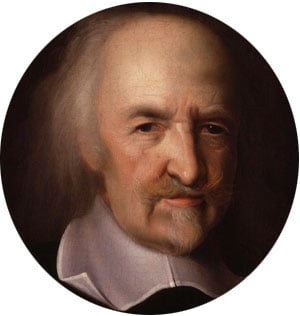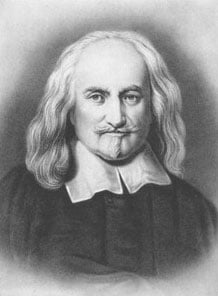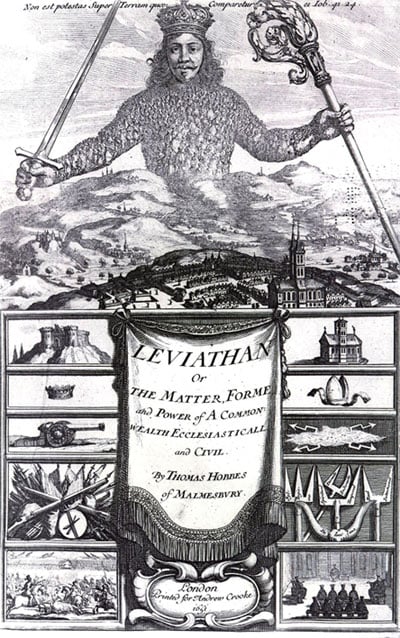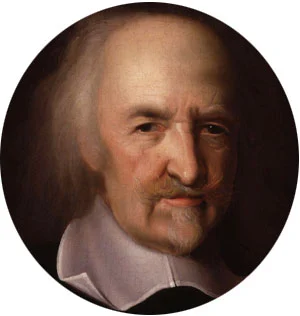
Who was Thomas Hobbes?
Thomas Hobbes was an accomplished English philosopher, historian, and scientist. Many consider Hobbes to be one of the preeminent thinkers of the last thousand years. Many of his thoughts, theories, beliefs, and works have led to what we now know as AI (Artificial Intelligence). His ideas regarding mathematics, science, and optics have likely led to many modern-day inventions and discoveries. He was also considered one of the first modern philosophers to put together a detailed social contract theory. This theory appeared in one of his most famous works, Leviathan.
Early Life
Hobbes was born on April 5, 1588, in a town called Malmesbury, located in Wiltshire, England. While not much is known about his mother, Hobbes’ father was also named Thomas Hobbes. The elder Hobbes was a local clergyman who had somewhat of a sordid reputation. He was known to indulge in card playing and left Malmesbury in 1604 after a fight in a churchyard with another clergyman.
Quick Facts
- Net Worth
- Unknown
- Children
- None known
- Nationality
- English
- Place of Birth
- England
- Fields of Expertise
- [“Philosophy”,”Politics”]
- Institutions
- Oxford
- Contributions
- Books and thoughts pertaining to government and social structure.
In spite of the scandal with his father, Hobbes was well-educated and attended school at an early age. He attended school at Westport, Wiltshire at the early age of four. At age 15 he went on to Magdalen Hall in Oxford. He received his degree from Oxford in 1608. His educational pursuits at Oxford were financed by his wealthy uncle, Francis Hobbes.

What Shaped Hobbes During His Early Years?
The influence of his father and his experiences working with the Cavendish family were likely what shaped Hobbes most dramatically during his early years. Working with these wealthy individuals allowed young Hobbes access to varied experiences as well as books. During this time only those of means had access to a variety of books and learning.
Serving occasionally for the Earls of Devonshire was probably another strong influence. He made many contacts with a variety of interesting individuals through these early connections. Many of these contacts included intellectuals throughout England. He later networked with philosophers and theologians in Paris. Through the Cavendish family, Hobbes also became acquainted with Lord Francis Bacon.
Bacon was well-known for philosophical thought and served as a statesman in England. These influences likely shaped his beliefs and helped him come to his conclusions regarding the state of nature and his social contract theory.
What Did He Do During the Later Years?
When he was older, Hobbes began to pursue more extensive scientific interests. Although he was not specifically trained in the sciences or mathematics at Oxford, Hobbes’ earnest scientific inquiry began in his middle age. He was particularly interested in motion and Euclid’s theorems in the Elements.
By the 1630s, Hobbes gained enough knowledge and understanding in the field of optics that he pursued his own independent research. After 1640 he was considered not only a serious theorist in politics and ethics, but in optics as well. Many future developers have come up with inventions and discoveries based on the previous scientific work of Thomas Hobbes.
Career
After graduating from Oxford, Hobbes’s first job was that of tutor for William Cavendish. Hobbes would spend many years working in various capacities for the Cavendish family and many of their associates. William Cavendish, who later was to become the 2nd Earl of Devonshire, was a pupil of Thomas Hobbes. For most of his adult life, Hobbes worked and socialized within this wealthy class of society.
Throughout his life, Hobbes wrote prolifically, thought deeply, and engaged in a variety of occupations. Some of the positions he held included tutor, a translator, and even a traveling companion. He also worked as a business representative, a political advisor, and as a scientific collaborator.
What Was Thomas Hobbes Known For?
While Thomas Hobbes gained knowledge, success, and fame in a variety of vast fields, he is best known for his philosophical writings and beliefs on a variety of subjects such as church and state, the state of nature, nominalism, and absolutism. His most famous work is Leviathan.
Hobbes is also well-known for his understanding of what he calls, the laws of nature. He defined laws of nature as those beliefs or precepts that can be determined by reason. A law of nature, according to Hobbes, is that everyone should “endeavour peace” when it is possible to attain; if not, we can engage in “war.”
Thomas Hobbes’ Personal Life
While Thomas Hobbes was born and died in England, he spent approximately a decade of his life in exile in Paris between 1640 and 1651. This was in regard to the civil wars that were occurring at the time. Hobbes defended absolute sovereignty in his philosophy regarding politics. For this reason, he generally sided with the royals. This put him at odds with the Parliament at the time. He was also unpopular with the French authorities and returned to England in 1651.
Hobbes’ religious beliefs are not universally agreed upon. Many historians claim he was not an atheist, but did not adhere to orthodox Biblical beliefs. Some claim he was likely a Deist. Deism was a view that gained popularity during the 17th and 18th centuries.
What Was Hobbes’ Net Worth?
It is assumed that Hobbes was born into a family of modest means. His uncle, who was well off, paid for young Hobbes to attend Oxford. Throughout his life, Hobbes socialized and lived among the wealthy and elite of his time. Whether he had accumulated much wealth or material goods is not known.
Was Hobbes Married or Have Any Children?
There is little known about his marital history or how many children he had. Most historical accounts reveal that there is no evidence that Hobbes ever married or had children.
Were there any Tragedies in His Life?
The greatest tragedy known in Hobbes’ life was that his father left his family when Thomas was still quite young. This occurred after his father had been in a brawl in the churchyard. The young Hobbes was likely not even five. This left the care of him and his two siblings to his mother and uncle.

What Was Thomas Hobbes’ Achievements and Awards?
Hobbes lived in a time when, at least by today’s standards, there were few awards or even much recognition given out for achievements. His philosophical and political thoughts, as well as his published works, are his primary legacy. His main concerns regarded the structure of society, and in particular, government. He promoted a sovereign government as an ideal state in order to protect individuals from war and global insecurity.
Thomas Hobbes Published Works
Hobbes released his first book of political philosophy in 1642. This particular work titled, De Cive focuses on various aspects of politics in regard to the civil unrest that was troubling England at the time.
One of the main points of his writings that he is famous for includes the philosophy that government should be given a wide range of powers by consent of the citizens based on their own self-interest. Hobbes promoted a social contract theory in which the masses will willingly trade many liberties for the safety and well-being of all.
During his later years in France, Hobbes wrote Leviathan. This work was published in 1651. This is his magnum opus with his views on society and human nature. A large portion of this work is devoted to scriptural exegesis. He viewed political, societal, and spiritual beliefs, and in particular, the Bible, as all intertwined.
When returning to England in his later years, Hobbes continued to write. In 1655, he published De Corpore. De Homine was published in 1658. Finally, Hobbes spent his last years reading and rewriting one of his boyhood favorites.
He went on to publish translations of Homer’s The Iliad and the Odyssey:
- 1629 – Hobbes published a translation of the History of the Peloponnesian War into English.
- 1642 – De Cive was Hobbes’ first published work regarding political philosophy.
- 1651 – Leviathan was considered Hobbes’ primary work and what he is best known for.
- 1655 – De Corpore covered topics of logic, language, math, physics, and metaphysics.
- 1658 – De Homine covered issues related to physiology and optics.
- 1668 – Hobbes published a Latin edition of Leviathan.
Thomas Hobbes Quotes
There are several noteworthy quotes that Thomas Hobbes is credited for saying. The most famous is probably, “solitary, poor, nasty, brutish, and short,” when referring to life in general. The quote has been reduced through the years to, “nasty, brutish, and short.”
The following are a few more well-known quotes:
- “Not believing in force is the same as not believing in gravitation.”
- “Curiosity is the lust of the mind.”
- “The war of every man against every man,” was one of his quotes in regards to the state of nature.
Hobbes is also known for the slogan By ratiocination, I mean computation. Hobbes explained that this meant, first of all, that thinking is a mental discourse. Thinking is about symbolic operations, like a form of calculating. This is one of many reasons why Hobbes is seen as one of the earliest proponents of artificial intelligence and a great influence on later inventions and discoveries.
Hobbes died on December 4th, 1679 at Hardwick Hall. He was 91 at the time of his death.
The image featured at the top of this post is ©Unknown author / public domain
